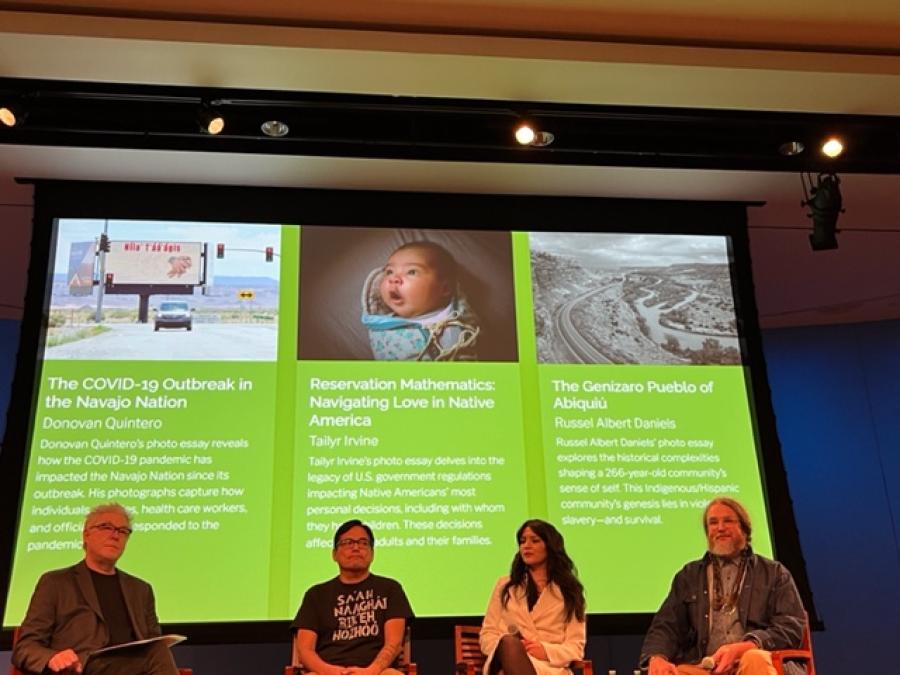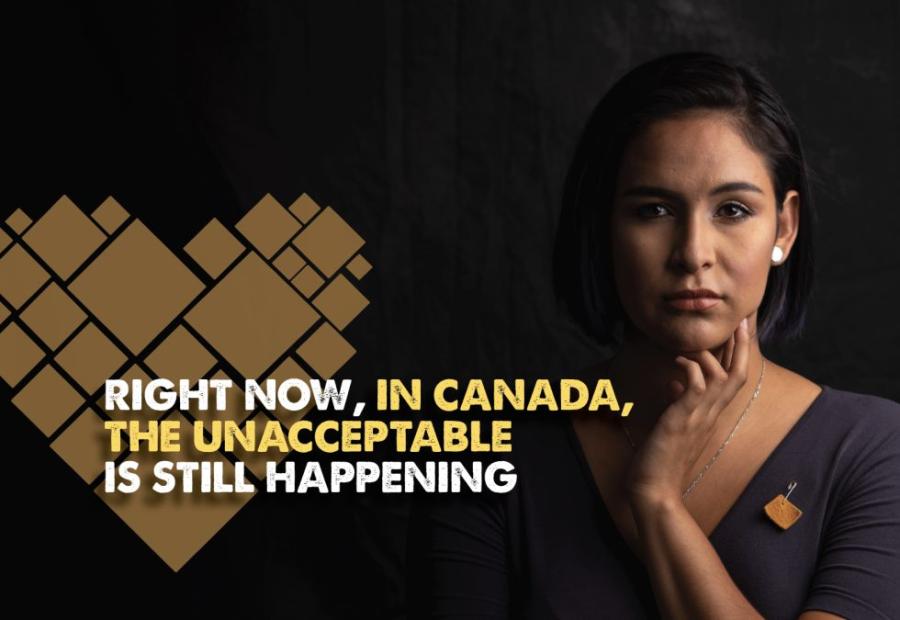
By Miriam Abel (CS Intern)
Westwin Elements, the city of Lawton, and the state of Oklahoma are moving forward with a cobalt, nickel, and manganese refinery on ancestral lands of the Kiowa, Comanche, and Apache Tribes without their Free, Prior and Informed Consent.
In a pivotal moment of Indigenous resistance, Tribal members have come together to form the Westwin Resistance movement, putting out a call across Turtle Island for help in raising awareness of the construction of a nickel refinery on their ancestral lands.
Westwin Elements is a startup company that hopes to make a name for itself in resource extraction. Its most recent plan includes constructing a nickel refinery on Indigenous territories without obtaining the Free, Prior and Informed Consent of the affected Nations.
Indigenous land defenders, Kaysa Whitley (Kiowa/Absentee Shawnee), Ashley Lamont (Absentee Shawnee, Oglala, and Sicangu Lakota), and Shawn-Dae Lawrence (Kiowa and Ktunaxa) of the Westwin Resistance movement, share many concerns about the construction, including its environmental impacts, violation of Indigenous sovereignty, and disregard for treaty responsibilities.
The project poses a direct threat to the sacred connection between Indigenous Peoples and their lands, as well as the long-term well being of Indigenous communities who rely on these territories for cultural, spiritual, and economic sustenance.
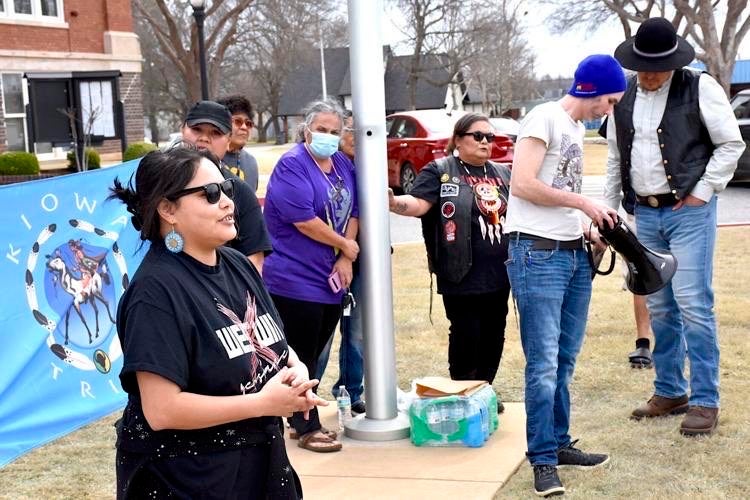
Kaysa Whitley, Coalition Coordinator for Westwin Resistance, addressing the crowd at a peaceful protest held outside of Lawton City Hall. Photo by Creeseworks.
Whitley is the Coalition Coordinator for Westwin Resistance. She is concerned about the impact Westwin Elements’ refinery has had on her relationship with her sacred territory. “The land is always the thing that I've come back to...When you are talking about putting toxic chemicals into the land, it is a direct severance of that connection. It's unfortunate," she says.
Lamont, who is National Campaign Director for Honor the Earth, emphasizes the urgent need to resist the encroachment of extractive industries on Indigenous lands. "We are really invested in fighting the so-called green energy transition because we believe it is not an actual solution to the climate crisis. This violence happens right in my backyard, with my friends and my community," she says, underscoring the interconnectedness of environmental justice and Indigenous rights.
Drawing on her ancestral knowledge and treaty responsibilities, Lawrence reflects on the historical trauma inflicted upon Indigenous Peoples and their lands: "Our chiefs make treaties to secure safety and good relationships for us. These lands are specifically meant to be agricultural, and once they're gone, they're gone," she says.

AIM Indian Territory and Westwin Resistance Coalition members, Gen Hadley and Hubert Stands, address the crowd at a peaceful protest held outside of Lawton City Hall. Photo by Creeseworks.
Land Dispossession
Land dispossession has impacted Indigenous communities in Oklahoma since the dawn of colonization. Indigenous Peoples were systematically removed and placed onto reservations so settler communities and industry could be built.
Lamont explains, “all of Oklahoma’s lakes are man-made, and many of them have been responsible for the relocation and removal of Indigenous people, even as recently as the 1960s and ‘70s. Many of our people, including my great-grandpa, were forced off his land so that the state of Oklahoma could build Lake Thunderbird. So, we have had to relive this all over again: being separated from our relationship with the land.”
Lamont’s experience is shared by many community members who fight to protect the little land they have left while history repeats itself at the expense of the emotional, cultural, and environmental safety in Indigenous communities.
Lawrence highlights how Indigenous communities work and live closely with the land: “After the Buffalo hunt, they would use the shoulder and leg bones to hand-till the ground. That was the Wichita people, and that's where the Wichita mountains got their name. They were eventually displaced and brought back, but not to those mountains. They were placed in the Anadarko area because the government had moved multiple Tribes onto the Wichita Mountain Range. Many Tribal members were lost during the shuffle. There is a lot of history that goes with those lands, and once they're gone, they're gone. That's what we are trying to protect.”
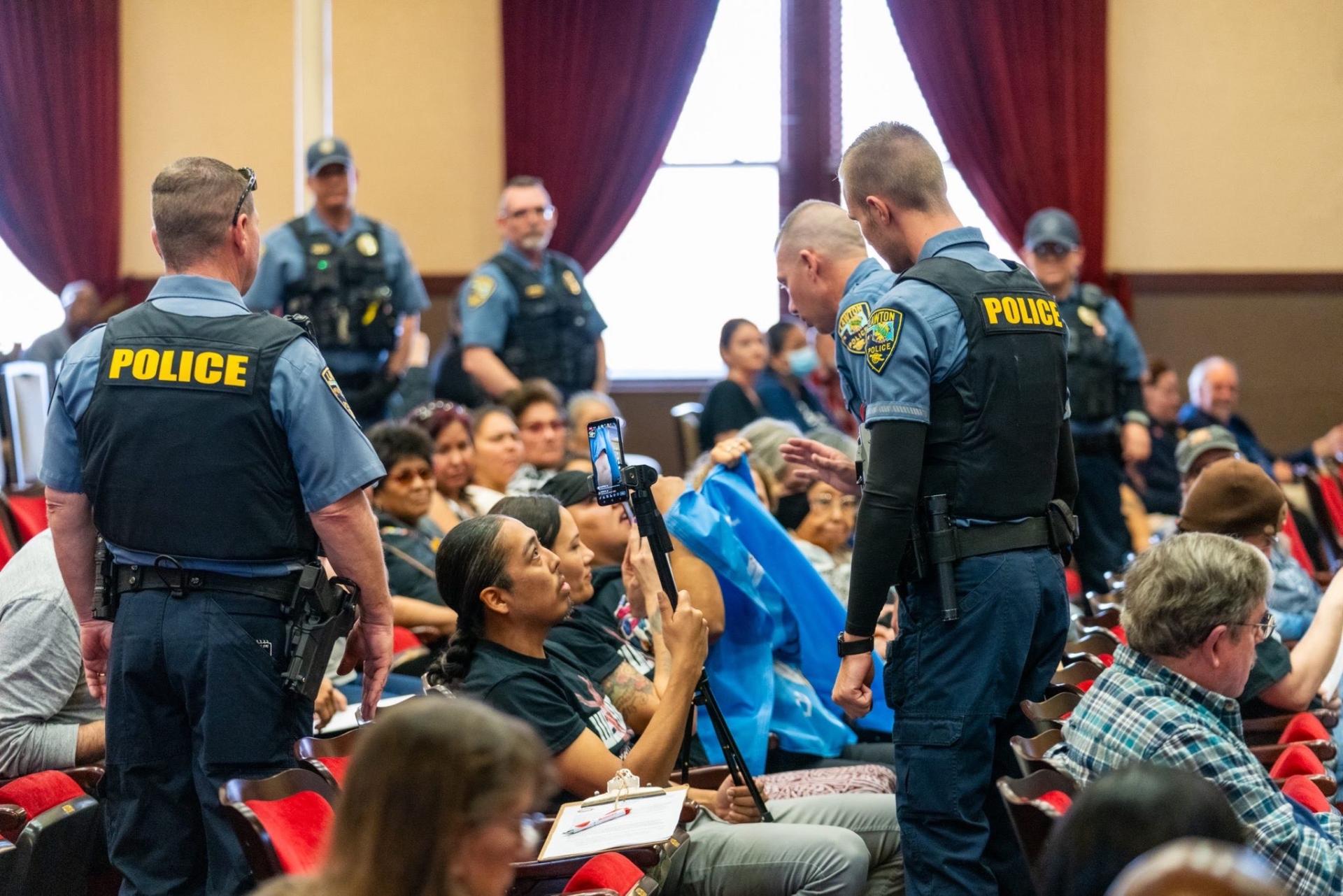
Members of the Westwin Resistance Coalition being intimidated by police at a city council meeting. Photo by Creeseworks.
We Are All Treaty People
Treaties are one of the few tools of power and agency Indigenous people have left in the colonial system. While many treaties were coerced and are fundamentally a misunderstanding between shared responsibility for the land and transfer of ownership and authority of the land, however imperfectly, they do secure Indigenous Peoples’ treaty rights.
Treaties explicitly outlined rights for Indigenous Peoples and responsibilities for settlers, both of which continue to be regarded as lawful. Justice requires that Tribal histories, rights, and circumstances, like those promised in treaties, be recognized.
Lawrence and Whitley are of the Chaddlesone family, making them direct descendants of Chief Set-Tain-Te (White Bear), who is the second signer of the Medicine Lodge Treaty of 1867. He signed the treaty to secure safety and good relationships for the Kiowa, Comanche, Apache, Cheyenne, and Arapaho people.
“This treaty states specific agriculture guidelines that have to be followed. And right now, turning the land into an industrial wasteland is not doing this treaty justice at all. The land is our ancestors. And that’s what we are trying to protect. I can see what this land has meant to all the people over hundreds of thousands of years.”
Westwin Elements does not respect the needs of Indigenous communities impacted by the nickel refinery project. When community members asked CEO and founder of Westwin Elements, Keileigh Long, if she would continue with the construction of her nickel and cobalt refinery, fully knowing that Indigenous consent had not been given, she answered, “We will not cease to exist as a project.”
Once again, Tribal concerns are ignored in the name of profit. Westwin Elements does not acknowledge whose land it plans to operate on, and that they, too, are treaty people. The company has an obligation to be in good relationship with Indigenous communities and protect the land, but instead, it does the opposite.
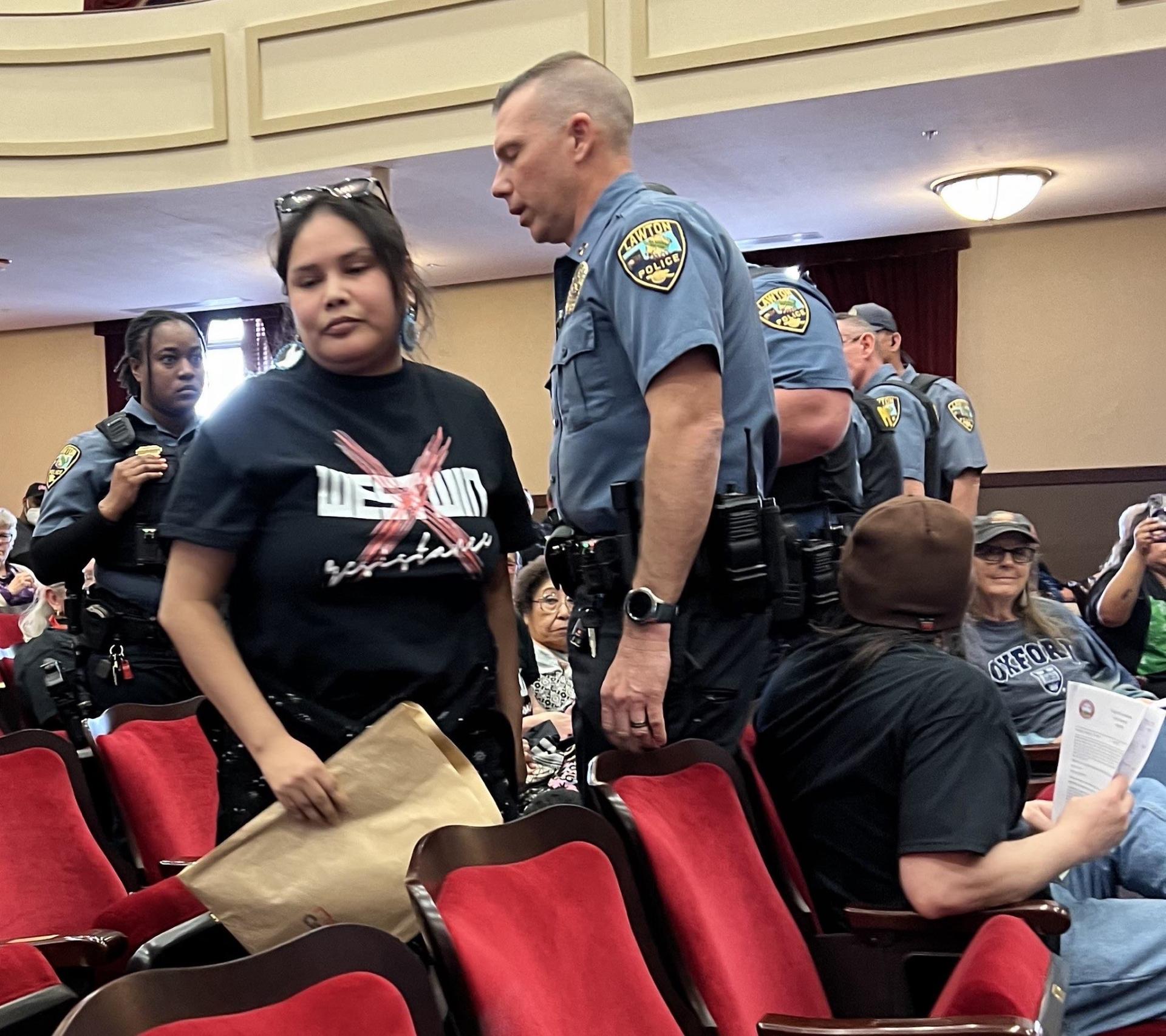
Kaysa Whitley being escorted from a city council meeting. Photo by Creeseworks.
Indigenous Defenders Are In Danger
Lamont, Lawrence, and Whitley have spoken extensively about the danger they put themselves in by doing this work. During a peaceful disruptive action, a white man assaulted Lawrence, shoving her so hard that her phone fell out of her hand. The police did not arrest him, and informed Lawrence they would not be pressing charges but would continue their own investigation.
Whitley points out that if roles were reversed and an Indigenous man had violently shoved a white woman, the police would have acted immediately. “Because no action is taken, we often have to do the police’s job and make sure that charges are pressed against people who use their power and privilege to cause violence against someone who speaks up,” she says.
Even when Westwin Resistance members raised their concerns in a peaceful and law-abiding manner, police still swarmed them. “We were fully lawful and the police still attacked us. They told us we did not have the right for assembly because we were no longer peaceful. We literally just sat there and raised our concerns about the project. This is setting a dangerous precedent because we are becoming a target.”
According to the women, the Lawton police do not protect the people. Instead, they protect the interests of companies and the state, even at the cost of harming community members and the land. “They are telling everyone around them that we aren’t equal and we don't deserve the basic human rights that everyone has, like protesting peacefully,” they say.
Even when Indigenous land defenders follow all colonial rules and regulations, they still end up being victims of police brutality and discrimination.
As matriarchs, the women of Westwin Resistance are responsible for the next generation: “We are women; we have to be the voices. Everybody else in the community has been so put down that they’re scared to speak up.”
The policing of Indigenous bodies is a strategy of colonial forces to intimidate and endanger Indigenous communities. Indigenous land defenders like Westwin Resistance face emotional, bodily, and psychological harm when they choose to protect their land. As community members, they need to decide: do I put myself in danger and protect my land, or do I not protect my land and end up in a place of danger where the community is deprived of their rights, land, and culture.
Lamont hopes that Westwin Resistance can set a precedent for Tribes to enact their Tribal sovereignty. “Tribes have faced such harsh law and have had our sovereignty attacked on so many levels, so Tribes are in a very weak position and they are afraid to fight the state,” she says.
Beyond The Colonial World
Westwin Resistance, like other Indigenous land defenders worldwide, envisions a different future: a future where Free, Prior and Informed Consent is at the center of any development on Indigenous lands, where the land is honored, and Indigenous Peoples’ relationship with it is understood as sacred.
For Westwin Resistance, the future has no place for Westwin Elements to move forward with construction without the communities’ consent.
“I want the city to take responsibility for bringing Westwin into our homes, and I want them to stop construction until Free, Prior and Informed Consent is had,” says Whitley. “We demand the city of Lawton to be more transparent around the project and think about who it benefits and who it hurts. We will not tolerate any future attacks on our sovereignty without a fight.”
This project should not exist,” Lamont says. “It's not a real solution to the climate crisis. As Indigenous Peoples, we want to be here on our sacred sites, in community, on the lands that Creator put us on since time immemorial.”
In a future where Indigenous self-determination and rights are respected and celebrated, Westwin Elements would have no grounds to stand on. Indigenous communities are fighting hard against the entitlement bestowed on industry by colonialism to come in and destroy their land.
“Indigenous Nations need to be serious about their sovereignty to achieve this future,” says Lamont. “That means putting people into power positions who are willing to fight for our communities, our ancestors, and our future generations.”
Westwin Resistance is making history for all Indigenous and Tribal communities across Turtle Island who are fighting extraction, standing up for sovereignty and the land. “We hope this sends a clear message to Westwin Elements: we are not disposable people, and this is not disposable land,” the group says.
Take Action
“If you are reading this, you are capable of standing up for sovereignty everywhere in the world. Look into your own area and find out what’s going on with the lands around you. Do your own research and stand up against this violence,” urges Whitley.
Though this issue may feel distant and impersonal, the Westwin Elements project is endangering Whitley, Lawrence, and Lamont’s lives, physically, spiritually, and emotionally. “It’s not easy. We get tired and exhausted,” they say. “We need a break, but we can’t take it. Westwin Elements is moving further each day, and all we can do is stand up and defend our land.”
Here is what you can do:
- Call the construction companies at +1 580 355 6655 and demand they cease working with Westwin Elements and respect recent Tribal resolutions against this project
- Call LEDC ‘s president, Brad Cooksey, at +1 580 353 7356 and express your solidarity with Westwin Resistance
- Send referrals of lawyers that specialize in Tribal rights to westwinresistance@gmail.com
- Follow @westwinresistance on social media (@resistwestwin on X)
Top photo: Kiowa Elder Leavetta Yeahquo addresses the crowd at a peaceful protest about Liberation Day. Photo by Creeseworks.
